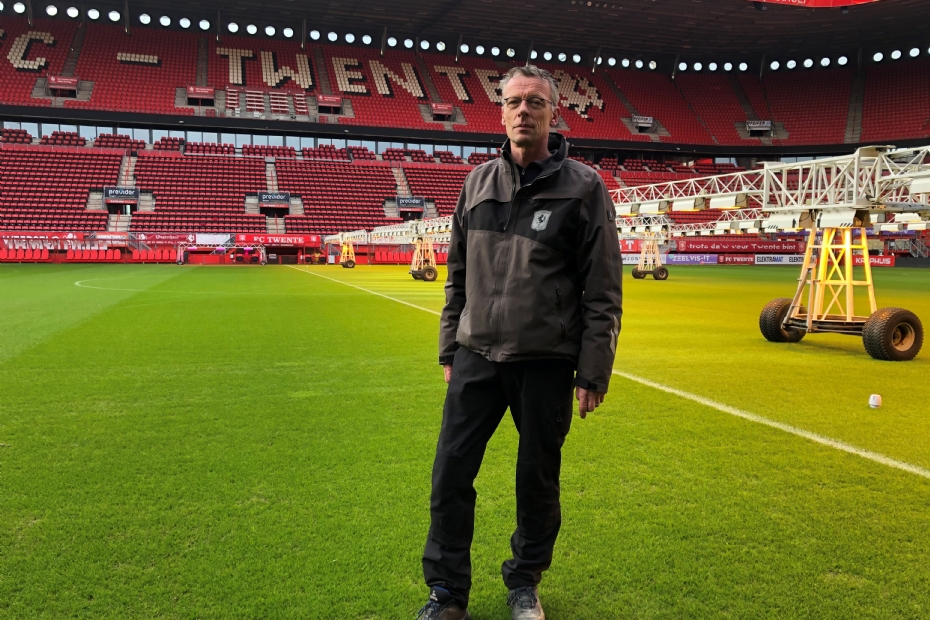Fieldmanager Henry de Weert of FC Twente: 'I now have many more levers to pull, so more control' |
|
|
|
|
 |
| 172 sec |
An aerial photo of the Het Rijk van Sybrook golf course in the office of field manager Henry de Weert is a reminder of his past as a greenkeeper. It was his last workplace on a golf course before he transitioned to football in 2010. That year, he joined FC Twente with the main task of improving the quality of the stadium field. He succeeded, and since the major renovation of the stadium field last year, he has been able to ensure even better quality.
 |
The fieldmanager of the Tukkers has daily consultations with equipment manager and former goalkeeper Sander Boschker. This keeps him well-informed about the technical staff's requirements. 'Communication always runs smoothly. If, for example, one of the two training fields cannot be used, I inform them; that works well.' In the week leading up to a home match, De Weert and his team prepare for match day. 'The field must not be too wet or too dry. I provide the right nutrients to the grass and, if necessary, extra iron for a better color.' During a home match, he immediately analyzes the condition of the field and plans the necessary maintenance for the following week.
Kitchen sieve
'I now have many more controls and therefore more control. The field condition at this time of year is significantly better than before the renovation,' he states with satisfaction on a cold January morning. Upon joining, he immediately took action. 'The stadium field at the time was not good, mainly due to poor drainage. By taking many measurements, I did everything I could to make the quality acceptable.' He also enjoys the challenge of creating the best possible field within existing constraints. One of his first actions in 2011 was removing the turf and eight centimeters of topsoil. Coarse sand was added to improve drainage before laying a new turf. 'We managed to complete this in a week. That was all the time we had,' he recalls. The company De Ridder carried out this task. 'Using a simple kitchen sieve, we measured how long it took for a liter of water to pass through the topsoil. Improving the top layer was the best we could do at the time.'
|
|
'The emergency solution from thirteen years ago turned out well: the top layer could be reused.'
| |
|
For thirteen years, De Weert managed to maintain the stadium field at the desired level, thanks in part to this crucial intervention and his resourcefulness. The long-held desire for a full renovation was finally fulfilled last year due to sufficient budget availability. The drainage, irrigation system, and field heating were renewed, and a new hybrid field was sown. Interestingly, the old top layer was reused. 'The emergency solution from thirteen years ago was so effective that the top layer was good enough to be reused. It was slightly depleted but supplemented with the right nutrients and organic material.' For drainage, a Draintalent system was installed, with additional valves to allow manual control in emergencies. De Weert proposed this: 'I like to be certain,' he says firmly. 'I won't let the moisture levels be off.'
In the genes
Avoiding risks and maximizing performance characterize this experienced field manager. His love and passion for turf might be in his genes; his grandfather and father were both greenkeepers. As a teenager, De Weert initially dreamed of owning a car business. After high school, he attended the Auto Technical School in Apeldoorn. 'During my internship and work as an MOT inspector, I developed an allergy to oil, leading to a troublesome skin condition. I had to find a job in another sector.' That became golf course maintenance. His grandfather worked as a greenkeeper at De Pan after selling his farm. His father also entered the profession and later moved the family to Apeldoorn when he became head greenkeeper at the Veluwse Golf Club and later in Nunspeet. De Weert: 'I was already helping on Saturdays and during holidays, so when I had to choose something else, the choice was easy. I love being outdoors and working with machines.' He sent numerous job applications and eventually started as an assistant greenkeeper in Almeerderhout. 'I already knew a bit about grass and basic mowing but had much to learn.'
Head greenkeeper
De Weert followed through and completed the IPC greenkeeper training. At his graduation ceremony, he met the head greenkeeper of De Hoge Kleij, who invited him to work there. 'I agreed on the condition that I could pursue head greenkeeper training. That's how I started as an assistant head greenkeeper.' His next career step led him to the Het Rijk van Sybrook golf course in Enschede, where he became head greenkeeper, managed a 'great team,' and enjoyed his work as well as the course expansion. Eventually, the course was acquired and became part of the Het Rijk golf course chain. De Weert: 'There was more central management, and I lost a lot of autonomy.'
|
|
'I still play football and love the game.'
| |
|
This article was originally published on February 14, 2025, on the Fieldmanager website.
| De Ridder B.V. (Golf-Spor... | |
| Utrechtse Golfclub ‘De ... | |
| |
| LOG IN
with your email address to respond.
|
|
|
| There are no comments yet. |
|